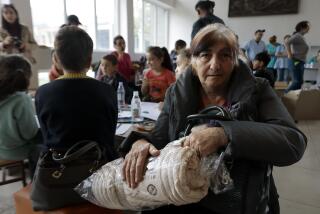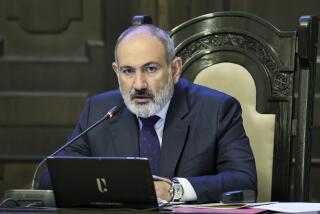No troops for Kyrgyzstan
- Share via
MOSCOW — A Moscow-led security organization Monday recommended offering logistical support and goods such as fuel to Kyrgyzstan rather than peacekeeping troops to help stop ethnic violence in the Central Asian country.
Kyrgyzstan law enforcement organizations, with some help, can control the rioting that began Thursday in Osh, said Nikolai Bordyuzha, secretary-general of the Collective Security Treaty Organization, which is made up of several former Soviet republics, including Russia and Kyrgyzstan.
Bordyuzha met with Russian President Dmitry Medvedev on Monday as officials announced that the death toll from the rioting in southern Kyrgyzstan had increased to at least 125, with more than 1,200 injured. Tens of thousands of people have fled the violence, many of them ethnic Uzbeks moving either into Uzbekistan or massing at the border.
“The current situation in Kyrgyzstan is intolerable, people have been killed, blood is being shed, and mass ethnic unrest is continuing,” Medvedev said, Interfax news agency reported. “This is extremely dangerous to that region, and therefore anything possible should be done to prevent such developments.”
Medvedev also indicated that the security organization’s leaders may need to reconvene if the situation worsens. He said he had shared the same message with Roza Otunbayeva, prime minister of the interim government in Kyrgyzstan. On Saturday, Moscow rejected Otunbayeva’s request to send troops to quash the riots.
But former Kyrgyzstan President Kurmanbek Bakiyev, speaking to reporters in Belarus on Monday, said bringing the situation back to normal required international forces. The interim government has lost control, said Bakiyev, who was ousted in a coup in April.
In Jalal-Abad, north of Osh, mobs continued to loot and burn houses and kill people.
An armored vehicle broke through a barricade made by residents in downtown Jalal-Abad, a witness said, and a crowd of civilians followed and immediately set a house on fire.
Ravil Khusnutdinov, 34, an ethnic Tatar, said he was attacked by a group of armed Kyrgyz civilians.
“I thought that was it,” said Khusnutdinov in a phone interview from Jalal-Abad. “One of them asked me in Kyrgyz language where I live and I answered in Russian.” The group left him alone.
In contrast to Jalal-Abad, Osh was much quieter Monday. Elders from the Kyrgyz and Uzbek communities met and broke a flatbread cake as a symbol of peace as authorities distributed food supplies in the center of the town.
“There is much less shooting in the streets and much less smoke, but occasionally you can see cars without license plates driving at fast speed across town and young men shooting randomly at still intact residential houses in districts predominantly populated by Uzbeks,” said Almaz Kalet, an Osh-based rights activist with the Center for Journalism in Extreme Situations in Moscow.
“Authorities began to distribute 350 grams [12 ounces] of flour per family from trucks in downtown Osh, but this is a ridiculously small amount,” Kalet said in a phone interview from Osh. “How can a family survive on 350 grams of flour?”
Jalal-Abad native Ulugbek Rakhmatullayev, a 28-year-old ethnic Uzbek economist who now lives in Moscow, said the official death toll figures from Kyrgyz officials should not be trusted.
“They are trying to hide the scope of the tragedy,” Rakhmatullayev said by phone from in front of the Russian White House, the seat of government in downtown Moscow, where he and a few dozen Uzbeks organized a picket demanding Russia send peacekeepers.
“My friends and relatives in the south of Kyrgyzstan all tell me that the death toll among Uzbeks cannot be lower than several hundred,” Rakhmatullayev said. “It is a genocide.”
Arkady Dubnov, a Central Asia expert with the Vremya Novostei daily, said he believed the violence stemmed from Bakiyev supporters.
“They launched a very ugly and very cynical game inciting the worst phobias in Kyrgyz people,” Dubnov said in a telephone interview. “I don’t think Kyrgyz police and army can resolve this problem on their own, and they already realize this themselves.”
More to Read
Sign up for Essential California
The most important California stories and recommendations in your inbox every morning.
You may occasionally receive promotional content from the Los Angeles Times.













